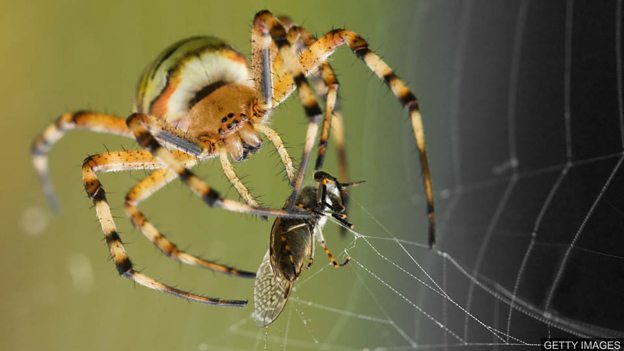媒体英语
Spiders inspire double-sided sticky tape to heal wounds 以蜘蛛网为灵感的双面胶带可粘合伤口

研究人员设计出了一种可以在术后快速将身体组织粘合起来的双面胶带。这个设计灵感源于蜘蛛在雨中捕猎时分泌的 “胶水”。
文字稿
Getting tissues in the body to form a tight seal is difficult because water on their surface makes them slippery. Sutures or stitches that hold a wound or cut together don't always work well and can lead to infections.
让身体组织形成紧密的密封是十分困难的,因为它们表面的水分会使组织变得光滑。用来将伤口缝合在一起的缝合针或缝合线并不总是有效,而且可能会导致感染。
Tissue glues which already exist can take several minutes to work and may drip onto other body parts. The scientists from MIT noticed how spiders catch their prey in the rain by secreting a sticky material containing a carbohydrate known as polysaccharides that absorb water from the surface of an insect almost instantaneously, leaving a small, dry patch the glue can then stick to.
已经存在的组织粘合胶需要几分钟才能发挥作用,并可能滴到身体的其它部位。来自麻省理工学院的科学家们注意到,蜘蛛在雨中捕捉猎物的方法是靠分泌一种含有带电多糖的粘性物质,这种物质几乎可以瞬间从昆虫表面吸收水分,留下一小块干燥的表面,从而黏着猎物。
The researchers developed a double-sided tape treated with a type of acid to do the same. They then tried it out on different types of rat and pig tissue, including the lung, small intestine, stomach, liver and skin. They found it worked within about five seconds. The team said that with more research it could be used in place of sutures and even to attach medical devices to organs such as the heart. But they warned there are still several years away from human trials.
研究人员设计了一种有同等功效的双面胶带,这种胶带经酸处理过。研究人员在不同类型的老鼠和猪组织上进行了试验,包括肺、小肠、胃、肝脏和皮肤。他们发现这种双面胶带在五秒钟内就可以将组织密封起来。这个研究小组表示,随着更多的研究,这种双面胶带可以用来代替缝合线,甚至可以用它把医疗设备固定到心脏等器官上。但他们同时提醒人们,离在人体上试验双面胶带仍需几年时间。
词汇
sutures 缝合针
stitches 缝合线
infections 感染
prey 猎物
secreting 分泌
carbohydrate 碳水化合物,糖类
polysaccharides 多糖
instantaneously 即刻地,瞬间地
treated 用……处理过
lung 肺
small intestine 小肠
stomach 胃
liver 肝脏
human trials 人体实验
阅读理解:请在读完上文后,回答下列问题 。
1. What can happen if stitches don’t hold a wound together?
2. How does the polysaccharide that the spider secretes work so that it can stick to its prey?
3. True or false? Researchers have created something that will work in the same way on humans as the spider’s polysaccharide does on its prey.
4. What is one of the possible outcomes of this research?
答案
1. What can happen if stitches don’t hold a wound together?
Sutures or stitches that hold a wound or cut together don't always work well and can lead to infections.
2. How does the polysaccharide that the spider secretes work so that it can stick to its prey?
The polysaccharides absorb water from the surface of an insect almost instantaneously, leaving a small, dry patch the glue can then stick to.
3. True or false? Researchers have created something that will work in the same way on humans as the spider’s polysaccharide does on its prey.
False. Researchers have developed a double sided tape treated with a type of acid to do the same thing but they say they are still several years away from human trials.
4. What is one of the possible outcomes of this research?
The team said that with more research it could be used in place of sutures and even to attach medical devices to organs such as the heart.



